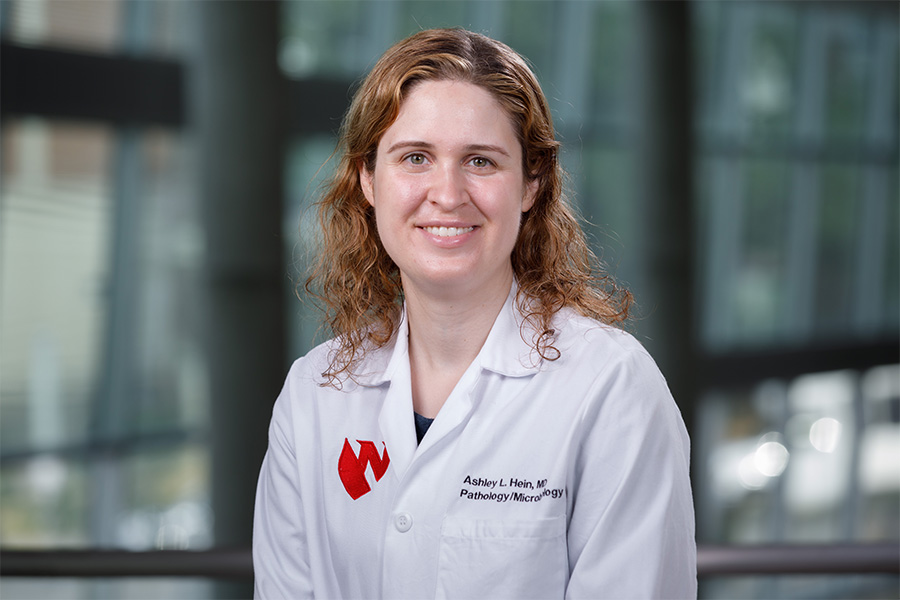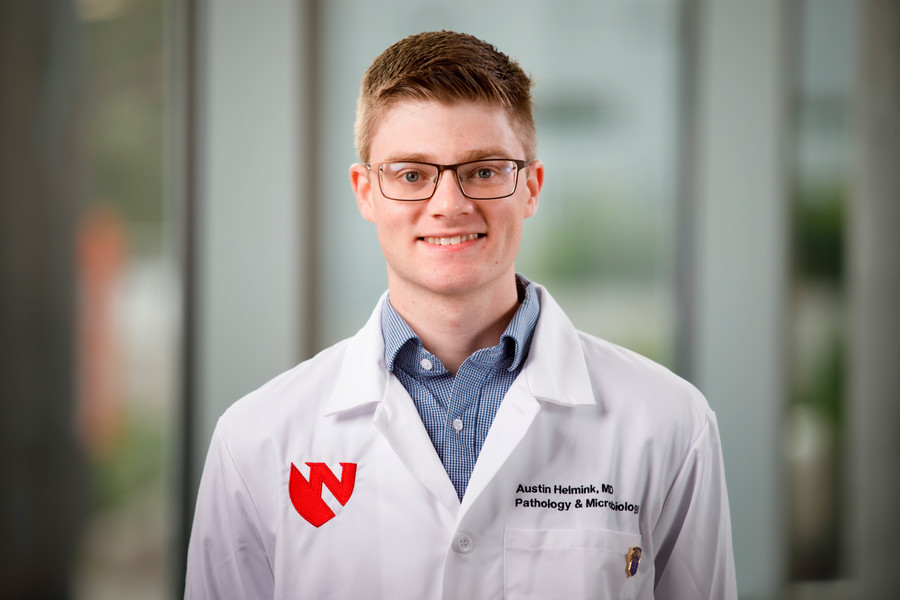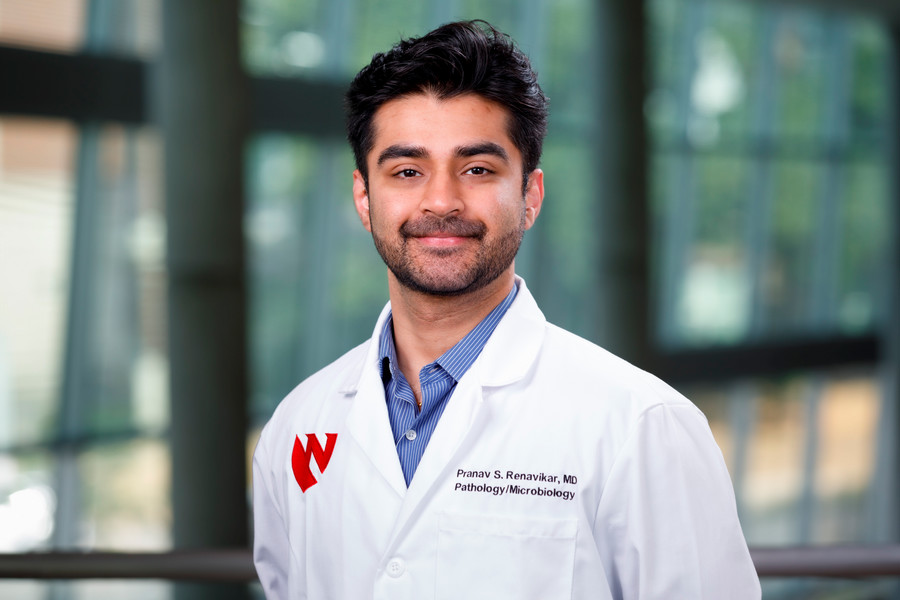Resident & Fellowship Awards
Excellence in Peer Resident Teaching Award

2023 Winner Ashley Hein, MD
The Excellence in Peer Resident Teaching Award is intended to recognize the valuable contribution of pathology residents in a wide variety of teaching activities at the University of Nebraska Medical Center. Selection for the award is based on the amount and quality of teaching. Residents are encouraged to submit teaching evaluations as support for the award.
Teaching activities include, but are not limited to M1 and M2 small groups; M2 laboratories; M4 supervision during Anatomic Pathology rotation; training of junior pathology residents on Autopsy and Surgical Pathology services; presentations to medical technologists and cytotechnologists; participation in planning or designing instructional teaching materials; and mentoring activities, including participation in the Pathology Student Interest Group, residency fairs, etc.
Excellence in Fellow Teaching Award

2022 Winner Jeffrey (John) Cannatella, MD
The Excellence in Fellow Teaching Award is intended to recognize the valuable contribution of pathology fellows in a wide variety of teaching activities at the University of Nebraska Medical Center. Selection for the award is based on the amount and quality of teaching. Residents, co-fellows, and faculty are encouraged to submit teaching evaluations as support for the award.
Teaching activities include, but are not limited to M1, M2, and BOD small groups; M2 laboratories; M4 supervision during Anatomic or Clinical Pathology rotations; training of pathology residents on Surgical Pathology, Molecular Pathology, or Hematopathology services; didactic lectures to Allied Health Students, including cytotechnology students, medical technology students, Biology of Disease students, etc.; participation in planning or designing instructional teaching materials; and mentoring activities, including participation in Pathoblasts, resident fairs, etc.
Quality Improvement Symposium

2022 Winner Ahmad Alshomrani, MBBS
A quality improvement project is a focused and structured effort to achieve better outcomes of a given process. Some of the earliest formal quality improvement initiatives originated in the manufacturing industry with the goal of avoiding production defects and improving efficiency. Similar quality improvement efforts have since been adopted by the health care industry. The goals of health care-related quality improvement projects are often to increase patient safety and to avoid the waste of limited resources. As leaders of the health care community, it is essential that we play an active role in the never-ending effort to improve the care of our patients. One way to help a large number of patients is to take part in quality improvement projects. Furthermore, resident and fellow involvement in quality improvement efforts is mandated by the ACGME Common Program Requirements.
Participating in at least one Quality Improvement (QI) project during their time in the program is a graduation requirement for each trainee. Residents/fellows are encouraged to generate ideas for a quality improvement project themselves, but faculty members may also identify projects and invite residents and/or fellows to participate. Projects must be related in some way to patient care and be done under the guidance of a faculty advisor. Multiple trainees may participate in one QI project with the approval of the program director and faculty advisor. Each trainee is to complete a proposal form prior to beginning the project and an outcomes report upon completion or prior to graduation. Both forms are approved by the faculty advisor and program director (or designee) per instructions. Progress will be reviewed at semi-annual evaluations.
Abstract, Manuscript and Poster Awards

Austin Hemlink, MD
2023 Recipients
Best AP Manuscript - Austin Hemlink, MD
"60-year-old male with rapidly progressive pneumocephalus caused by Clostridium septicum in the setting of an occult colonic adenocarcinoma."

Pranav Renavikar, MBBS
Best AP Poster/Abstract - Pranav Renavikar, MBBS
“Extent of Primary Gleason Pattern 4 Carcinoma Predicts Adverse Outcome Independent of Secondary Pattern 3 or 5 in Prostatic Needle Core Biopsies.”
Best CP Poster/Abstract - Pranav Renavikar, MBBS
"Reduced intraobserver correlation of blast identification by digital scans of peripheral blood smears compared to other morphologic criteria."
Research Grant Award Program for Clinical Residents and Fellows
In 2024, the DPMI-RGA was created to provide up to $10,000 funding for high-quality research projects leading to publications by departmental clinical trainees for whom other funding sources are not available. The aim of this program is to advance the experience and mentorship in clinical and translational research. All residents and fellows enrolled in our accredited program with support of a faculty mentor are eligible to apply for this award with only one project per applicant per year.
RGA Fall 2024 Recipients
RGA Spring 2025 Recipients
Previous Resident & Fellowship Award Recipients
- 2023 - Ashley Hein, MD
- 2022 - Archana Kanteti, MBBS
- 2021 - Simran Mashiana, MBBS
- 2020 - Alejandro Wolf, DO
- 2019 - Nicholas Lintel, MD
2022 - Ahmad Alshomrani, MBBS
"Immunohistochemistry & Reporting Guide"
2023
- Best AP Manuscript - Austin Hemlink, MD
- Best AP Poster/Abstract - Pranav Renavikar, MBBS
- Best CP Poster/Abstract - Pranav Renavikar, MBBS
2022
- Best AP Manuscript - Joseph Rohr, MD, PhD
- Best CP Manuscript - Ashley Hein, MD
- Best AP Poster/Abstract – Ahmad Alshomrani, MBBS
- Best CP Poster/Abstract - Pranav Renavikar, MBBS